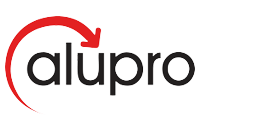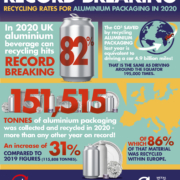UK aluminium beverage can recycling hits record-breaking 82% in 2020
Data published earlier this month by the Environment Agency (EA) reveals that aluminium beverage can recycling hit its highest ever rate in 2020 – an impressive 82%. This represents a year-on-year increase of 6% in a market that saw significant growth.
With the COVID-19 pandemic leading to a significant increase in at-home consumption, more aluminium packaging was collected and recycled than any year on record. Packaging Recovery Notes (PRNs) were issued for a total of 151,515 tonnes, an increase of 31% compared to 2019 figures (115,808 tonnes).
Breaking down these figures, 106,047 tonnes of separately collected aluminium packaging was recorded in 2020 (compared to 89,543 in 2019), while the volume recovered from incinerator bottom ash (IBA) increased from 26,265 (2019) to 45,468 (2020). Reassuringly, 86% of the collected aluminium packaging was recycled within Europe.
Compared to other packaging materials, many of which saw recycling rates increase year-on-year, aluminium reported by far the greatest rise. Exceeding 2020 business targets by a staggering 15% and realising a surplus of 36,845 tonnes, 2020 boasts the highest ever aluminium packaging recycling rate.
Rick Hindley, executive director at Alupro, commented: “In a year where aluminium packaging sales figures rose significantly, announcing record-breaking recycling rates – in particular an aluminium beverage can rate reaching 82% – is excellent news indeed.
“A sharp increase in the volume of separately collected aluminium packaging recovered at the kerbside is a clear reflection of changing consumer behaviours and increasing awareness of the benefits of recycling, while the rise in the volume of aluminium recovered from IBA can be attributed to a number of new companies approved to issue PRNs and the commissioning of several new UK energy recovery facilities.
“Looking forward to the next 12 months, which sees the annual target for aluminium packaging recycling increase to 66% and a carry-in of 8,326 tonnes, it’s too early to predict how volumes will change. Figures for the first three months of 2021 suggest that aluminium packaging collection rates have continued to grow. However, with lockdown restrictions now easing and more packaging consumed on-the-go, it’s imperative that we maintain best practice recycling practices – whether inside or outside of the home.”
To access the 2020 recycling rates, visit the Environment Agency’s National Packaging Waste Database (NPWD) here.
ENDS
- National Packaging Waste Data (NPWD) reports 2020 sales based on 2019 actual volumes. Rather than using 2019 production/sales volumes (as reported on NPWD) to determine the aluminium packaging recycling rate, the figure referenced in the text above (68%) uses predictive data for 2020 to provide a more accurate calculation. If 2019 production/sales volumes were used, the aluminium packaging recycling rate for 2020 would be 71%.
- The drinks can recycling rate is calculated based on sales data reported confidentially by drinks can manufacturers.


